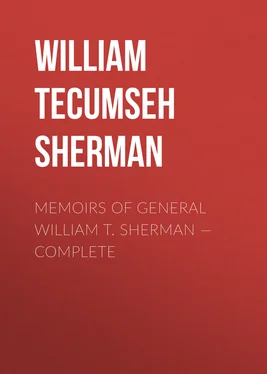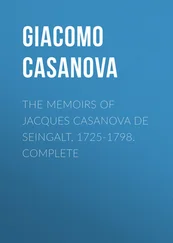William Tecumseh Sherman - Memoirs of General William T. Sherman — Complete
Здесь есть возможность читать онлайн «William Tecumseh Sherman - Memoirs of General William T. Sherman — Complete» — ознакомительный отрывок электронной книги совершенно бесплатно, а после прочтения отрывка купить полную версию. В некоторых случаях можно слушать аудио, скачать через торрент в формате fb2 и присутствует краткое содержание. Жанр: Биографии и Мемуары, История, foreign_edu, foreign_antique, foreign_prose, на английском языке. Описание произведения, (предисловие) а так же отзывы посетителей доступны на портале библиотеки ЛибКат.
- Название:Memoirs of General William T. Sherman — Complete
- Автор:
- Жанр:
- Год:неизвестен
- ISBN:нет данных
- Рейтинг книги:4 / 5. Голосов: 1
-
Избранное:Добавить в избранное
- Отзывы:
-
Ваша оценка:
- 80
- 1
- 2
- 3
- 4
- 5
Memoirs of General William T. Sherman — Complete: краткое содержание, описание и аннотация
Предлагаем к чтению аннотацию, описание, краткое содержание или предисловие (зависит от того, что написал сам автор книги «Memoirs of General William T. Sherman — Complete»). Если вы не нашли необходимую информацию о книге — напишите в комментариях, мы постараемся отыскать её.
Memoirs of General William T. Sherman — Complete — читать онлайн ознакомительный отрывок
Ниже представлен текст книги, разбитый по страницам. Система сохранения места последней прочитанной страницы, позволяет с удобством читать онлайн бесплатно книгу «Memoirs of General William T. Sherman — Complete», без необходимости каждый раз заново искать на чём Вы остановились. Поставьте закладку, и сможете в любой момент перейти на страницу, на которой закончили чтение.
Интервал:
Закладка:
While I was at Sacramento General Smith had gone on his contemplated trip to Oregon, and promised that he would be back in December, when he would send me home with dispatches. Accordingly, as the winter and rainy season was at hand, I went to San Francisco, and spent some time at the Presidio, waiting patiently for General Smith's return. About Christmas a vessel arrived from Oregon with the dispatches, and an order for me to deliver them in person to General Winfield Scott, in New York City. General Smith had sent them down, remaining in Oregon for a time. Of course I was all ready, and others of our set were going home by the same conveyance, viz., Rucker, Ord, A. J. Smith—some under orders, and the others on leave. Wanting to see my old friends in Monterey, I arranged for my passage in the steamer of January 1, 1850, paying six hundred dollars for passage to New York, and went down to Monterey by land, Rucker accompanying me. The weather was unusually rainy, and all the plain about Santa Clara was under water; but we reached Monterey in time. I again was welcomed by my friends, Dona Augustias, Manuelita, and the family, and it was resolved that I should take two of the boys home with me and put them at Georgetown College for education, viz., Antonio and Porfirio, thirteen and eleven years old. The dona gave me a bag of gold-dust to pay for their passage and to deposit at the college. On the 2d day of January punctually appeared the steamer Oregon.
We were all soon on board and off for home. At that time the steamers touched at San Diego, Acapulco, and Panama. Our passage down the coast was unusually pleasant. Arrived at Panama, we hired mules and rode across to Gorgona, on the Cruces River, where we hired a boat and paddled down to the mouth of the river, off which lay the steamer Crescent City. It usually took four days to cross the isthmus, every passenger taking care of himself, and it was really funny to watch the efforts of women and men unaccustomed to mules. It was an old song to us, and the trip across was easy and interesting. In due time we were rowed off to the Crescent City, rolling back and forth in the swell, and we scrambled aboard by a "Jacob's ladder" from the stern. Some of the women had to be hoisted aboard by lowering a tub from the end of a boom; fun to us who looked on, but awkward enough to the poor women, especially to a very fat one, who attracted much notice. General Fremont, wife and child (Lillie) were passengers with us down from San Francisco; but Mrs. Fremont not being well, they remained over one trip at Panama.
Senator Gwin was one of our passengers, and went through to New York. We reached New York about the close of January, after a safe and pleasant trip. Our party, composed of Ord, A. J. Smith, and Rucker, with the two boys, Antonio and Porfirio, put up at Delmonico's, on Bowling Green; and, as soon as we had cleaned up somewhat, I took a carriage, went to General Scott's office in Ninth Street, delivered my dispatches, was ordered to dine with him next day, and then went forth to hunt up my old friends and relations, the Scotts, Hoyts, etc., etc.
On reaching New York, most of us had rough soldier's clothing, but we soon got a new outfit, and I dined with General Scott's family, Mrs. Scott being present, and also their son-in-law and daughter (Colonel and Mrs. H. L. Scott). The general questioned me pretty closely in regard to things on the Pacific coast, especially the politics, and startled me with the assertion that "our country was on the eve of a terrible civil war." He interested me by anecdotes of my old army comrades in his recent battles around the city of Mexico, and I felt deeply the fact that our country had passed through a foreign war, that my comrades had fought great battles, and yet I had not heard a hostile shot. Of course, I thought it the last and only chance in my day, and that my career as a soldier was at an end. After some four or five days spent in New York, I was, by an order of General Scott, sent to Washington, to lay before the Secretary of War (Crawford, of Georgia) the dispatches which I had brought from California. On reaching Washington, I found that Mr. Ewing was Secretary of the Interior, and I at once became a member of his family. The family occupied the house of Mr. Blair, on Pennsylvania Avenue, directly in front of the War Department. I immediately repaired to the War Department, and placed my dispatches in the hands of Mr. Crawford, who questioned me somewhat about California, but seemed little interested in the subject, except so far as it related to slavery and the routes through Texas. I then went to call on the President at the White House. I found Major Bliss, who had been my teacher in mathematics at West Point, and was then General Taylor's son-in-law and private secretary. He took me into the room, now used by the President's private secretaries, where President Taylor was. I had never seen him before, though I had served under him in Florida in 1840-'41, and was most agreeably surprised at his fine personal appearance, and his pleasant, easy manners. He received me with great kindness, told me that Colonel Mason had mentioned my name with praise, and that he would be pleased to do me any act of favor. We were with him nearly an hour, talking about California generally, and of his personal friends, Persifer Smith, Riley, Canby, and others: Although General Scott was generally regarded by the army as the most accomplished soldier of the Mexican War, yet General Taylor had that blunt, honest, and stern character, that endeared him to the masses of the people, and made him President. Bliss, too, had gained a large fame by his marked skill and intelligence as an adjutant-general and military adviser. His manner was very unmilitary, and in his talk he stammered and hesitated, so as to make an unfavorable impression on a stranger; but he was wonderfully accurate and skillful with his pen, and his orders and letters form a model of military precision and clearness.
CHAPTER IV.
MISSOURI, LOUISIANA, AND CALIFORNIA
Having returned from California in January, 1850, with dispatches for the War Department, and having delivered them in person first to General Scott in New York City, and afterward to the Secretary of War (Crawford) in Washington City, I applied for and received a leave of absence for six months. I first visited my mother, then living at Mansfield, Ohio, and returned to Washington, where, on the 1st day of May, 1850, I was married to Miss Ellen Boyle Ewing, daughter of the Hon. Thomas Ewing, Secretary of the Interior. The marriage ceremony was attended by a large and distinguished company, embracing Daniel Webster, Henry Clay, T. H. Benton, President Taylor, and all his cabinet. This occurred at the house of Mr. Ewing, the same now owned and occupied by Mr. F. P. Blair, senior, on Pennsylvania Avenue, opposite the War Department. We made a wedding tour to Baltimore, New York, Niagara, and Ohio, and returned to Washington by the 1st of July. General Taylor participated in the celebration of the Fourth of July, a very hot day, by hearing a long speech from the Hon. Henry S. Foote, at the base of the Washington Monument. Returning from the celebration much heated and fatigued, he partook too freely of his favorite iced milk with cherries, and during that night was seized with a severe colic, which by morning had quite prostrated him. It was said that he sent for his son-in-law, Surgeon Wood, United States Army, stationed in Baltimore, and declined medical assistance from anybody else. Mr. Ewing visited him several times, and was manifestly uneasy and anxious, as was also his son-in-law, Major Bliss, then of the army, and his confidential secretary. He rapidly grew worse, and died in about four days.
At that time there was a high state of political feeling pervading the country, on account of the questions growing out of the new Territories just acquired from Mexico by the war. Congress was in session, and General Taylor's sudden death evidently created great alarm. I was present in the Senate-gallery, and saw the oath of office administered to the Vice-President, Mr. Fillmore, a man of splendid physical proportions and commanding appearance; but on the faces of Senators and people could easily be read the feelings of doubt and uncertainty that prevailed. All knew that a change in the cabinet and general policy was likely to result, but at the time it was supposed that Mr. Fillmore, whose home was in Buffalo, would be less liberal than General Taylor to the politicians of the South, who feared, or pretended to fear, a crusade against slavery; or, as was the political cry of the day, that slavery would be prohibited in the Territories and in the places exclusively under the jurisdiction of the United States. Events, however, proved the contrary.
Читать дальшеИнтервал:
Закладка:
Похожие книги на «Memoirs of General William T. Sherman — Complete»
Представляем Вашему вниманию похожие книги на «Memoirs of General William T. Sherman — Complete» списком для выбора. Мы отобрали схожую по названию и смыслу литературу в надежде предоставить читателям больше вариантов отыскать новые, интересные, ещё непрочитанные произведения.
Обсуждение, отзывы о книге «Memoirs of General William T. Sherman — Complete» и просто собственные мнения читателей. Оставьте ваши комментарии, напишите, что Вы думаете о произведении, его смысле или главных героях. Укажите что конкретно понравилось, а что нет, и почему Вы так считаете.












